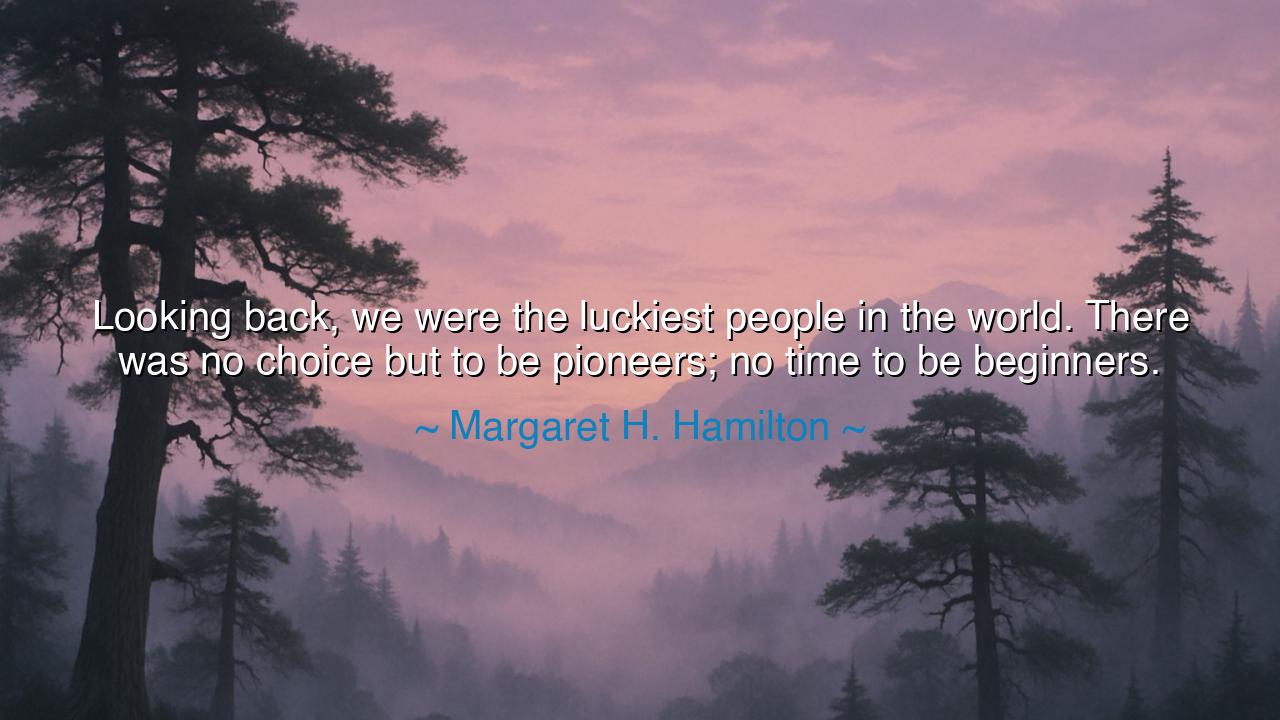
Looking back, we were the luckiest people in the world. There
Looking back, we were the luckiest people in the world. There was no choice but to be pioneers; no time to be beginners.






Margaret H. Hamilton, the brilliant software engineer whose code helped carry humankind to the moon, once reflected: “Looking back, we were the luckiest people in the world. There was no choice but to be pioneers; no time to be beginners.” In her words is the voice of one who stood at the frontier of the unknown, where hesitation was impossible and the work of ordinary men and women became extraordinary by necessity. It is a reminder that history’s greatest leaps are often made not by those who are fully prepared, but by those who dare when there is no time to wait.
The meaning of this quote rests in the contrast between pioneers and beginners. A beginner is one who learns slowly, with mistakes tolerated and time afforded for growth. But a pioneer is thrust into uncharted lands, with no guide and no safety net, where each decision is irreversible and every mistake costly. Hamilton and her team at NASA’s Apollo program were pioneers in this truest sense. There was no preexisting blueprint for space travel, no ancient map of the heavens to follow in code. They wrote the language as they spoke it, carved the road as they walked it.
The story of the Apollo missions illustrates this well. In 1969, as the Apollo 11 lunar module descended toward the moon’s surface, alarms suddenly blared from the onboard computer. Many would have panicked, for the unknown error codes could have meant disaster. But the software Hamilton’s team had created was robust, designed with foresight to prioritize critical functions. Because of that design, the landing continued safely, and Neil Armstrong set foot on the moon. Here we see her truth: there was no time to “be beginners.” Every decision carried the weight of destiny. Their pioneering work changed the course of history.
We may look further back to the age of exploration for parallels. When Christopher Columbus and his sailors set out across the Atlantic, they too had no room to be beginners. The ocean did not forgive hesitation; storms and hunger gave them no luxury of extended learning. They became pioneers simply by surviving and pressing onward. Though history may judge the consequences of their journeys with complexity, the spirit of being forced to create paths where none existed remains the same.
The lesson here is that when destiny calls, one cannot always wait for perfect preparation. There are moments in life where the opportunity, the challenge, or the crisis demands that we step forward as pioneers even when we feel unready. In those moments, courage becomes the teacher, and necessity shapes us faster than study ever could. To look back, as Hamilton did, is to realize that what felt like trial at the time was in truth a gift—an honor to stand at the edge of the unknown and be transformed by it.
In practice, this means embracing the times when you feel thrown into the deep waters of responsibility. Do not curse the absence of training wheels, for it is precisely their absence that forces your hidden strength to awaken. When a task seems overwhelming, when you feel you are only a beginner, remember Hamilton’s words: sometimes life gives us no time to be beginners, only the chance to rise as pioneers. Take that chance, for it may be the very moment that shapes not only your future but the future of generations to come.
Therefore, children of tomorrow, remember Margaret Hamilton’s wisdom: to be lucky is not to walk an easy road, but to be thrust into a place where only pioneers can survive. Do not fear such times. Welcome them, for though they demand your all, they grant you the honor of leaving footprints where none existed before. And when you look back, you too may say with gratitude: we were the luckiest people in the world, for we were called to be pioneers.






AAdministratorAdministrator
Welcome, honored guests. Please leave a comment, we will respond soon